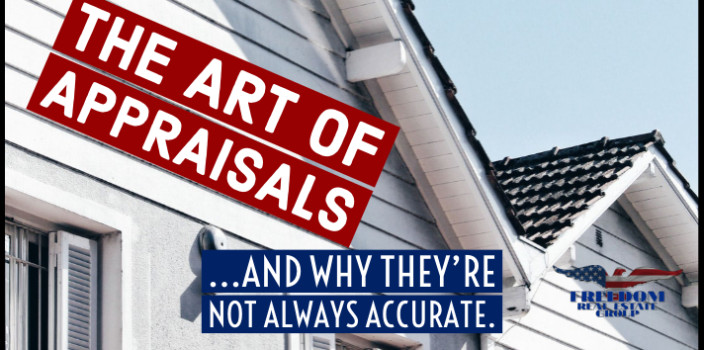Appraisals are truly an art; not a science. What one appraiser says is worth $100,000, another appraiser could say it’s worth $130,000. So why would an appraisal come in below the purchase price? Lets dive into this first with the definition of an appraisal.
Real estate appraisal, property valuation or land valuation is the process of developing an opinion of value, for real property (usually market value).
There is one word in there that results in varied appraisal values: opinion.
An appraisal is truly just an opinion. Granted, appraisers must go through training, classes and state certification. But many factors, including experience, can play into a bad appraisal. Here are six reasons an appraisal may come in lower than expected:
- Hot Market. This almost sounds contrary to what you would believe, but it can make an appraisal come out lower. Appraisers use sold properties to determine value. Therefore, if a market is hot and properties are selling at higher values, they may not have time to appear on an MLS or county record by the time the appraisal is complete. In some markets, one month can make a huge difference in value based on the demand of the market.
- Cold Market. Just like a hot market can affect an appraisal, so can a cold market. If there aren’t many sold properties in an immediate area, or many sold properties that truly match up to your property, this could result in a lower appraisal. Appraisers in this case may expand their search into less desireable areas or be forced to use subpar comps.
- Lack of Market Knowledge. Each neighborhood has their own characteristics. Different school systems, up and coming niche areas, and more. If an appraiser isn’t aware of these details – including areas which are taking a turn for the better in terms of property values, crime, etc – it could make a huge difference in the value they place on the property.
- Lack of Experience. This may be one of the biggest factors that plays into poor appraisals. More specifically, when it comes to turnkey real estate investment appraisals. Although an appraiser may be experienced in retail, owner-occupied properties, they may not be aware of the work, money, and value put into turnkey properties once the rehab is complete. For example, we had a duplex property appraised and it came in quite a bit below purchase price. The lender ordered a second appraisal and it came in slightly over purchase price. When we spoke to the second appraiser, he stated he used the county auditor’s website to find recent solds because in his words, “nice duplex properties are rarely sold on the MLS. Only distressed ones are.” This is true. Most MLS listed duplexes are distressed or outdated in terms of finishes. Updated duplexes are often sold directly to investors; outside the MLS. What did the first appraiser use? Only MLS listings. This is the difference between an experienced appraiser – specifically with investment properties – and one that isn’t.
- Housing Crash. No. We’re not saying we haven’t recovered. However, the mentality and mandates of the housing crash still loom over us. Many regulations and rule changes have happened for appraisers. Not only that, many appraisers are now very cautious about putting high values on properties because of the mass scrutiny they received during and after the housing crash.
- Bad Comps. This is a big player in a poor appraisal. Whether it’s because there aren’t comparable updated properties in the area, the appraiser isn’t experienced in finding proper comp properties, or the market just isn’t supporting good comparables, this can truly make an appraisal dismal. If an appraisal is ever received that’s below purchase price, look at the comps being used. Are they truly comparable to your property receiving the appraisal?
All in all, appraisals have a place in real estate. They are a third-party opinion of value and can give you an idea of the property’s worth. However, they are not always accurate for a multitude of reasons.
When investing in turnkey real estate, you must also consider that these properties are income producing assets.
Almost all appraisals for properties that are four units are less are using a sales approach; not an income-producing approach. Based on the income the property produces, the value can definitely be supported when you’re working with a repuatable turnkey company.
Want to learn more about Freedom Real Estate Group or Turnkey Real Estate Investing?
Contact us via the form below!
Contents of this message/blog post are of general nature only and should not be relied upon solely when making an investment decision. We are not attorneys or financial advisors and any advice or answers to questions in these communications to you is hypothetical only. If you need legal or financial advice, please consult an attorney or financial advisor of your choice.



